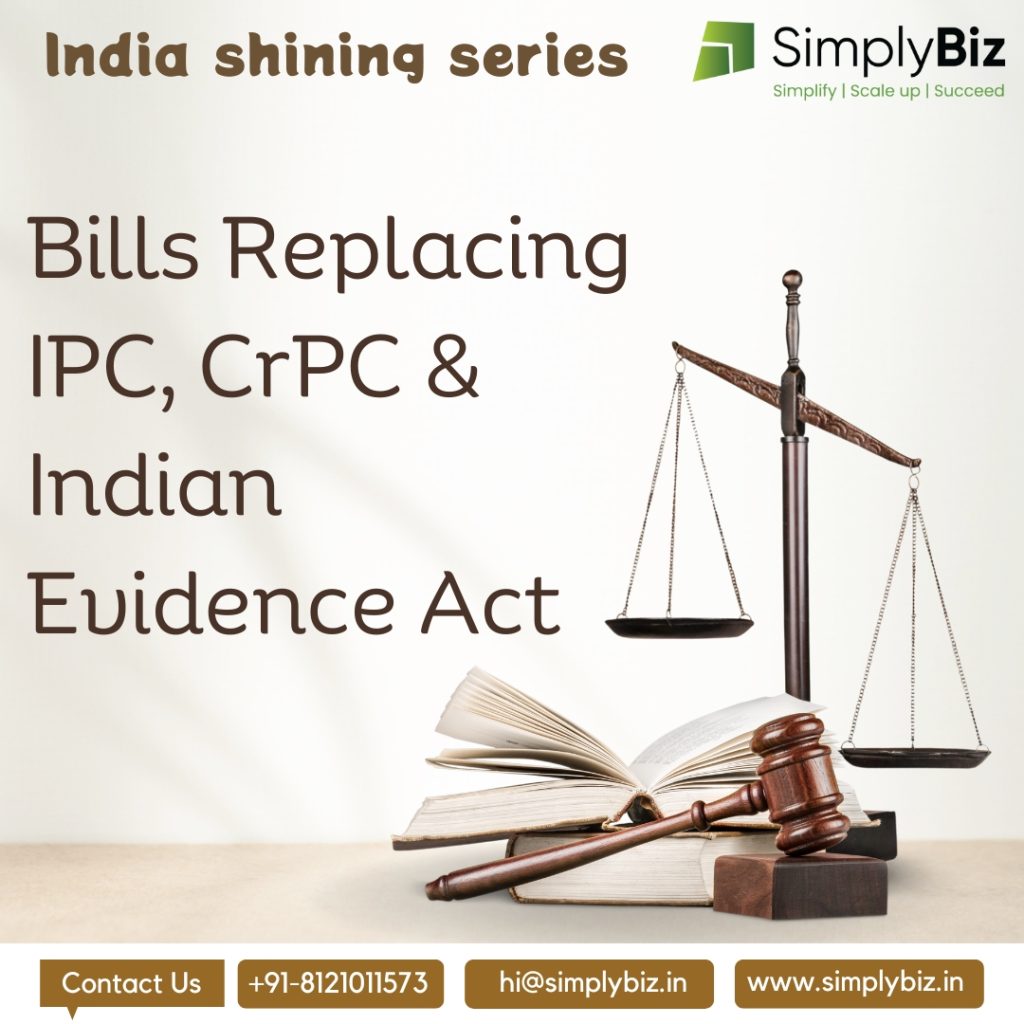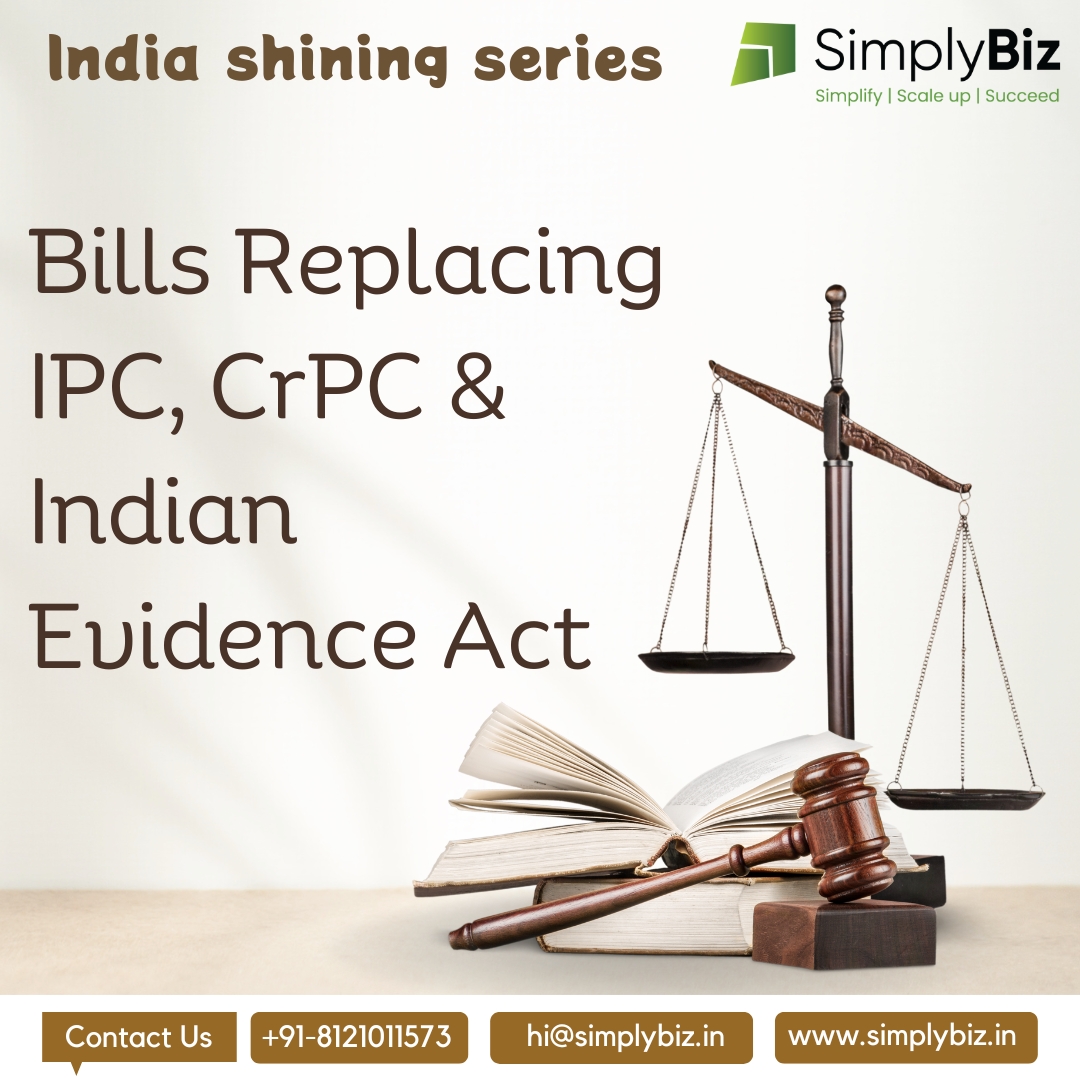Bills Replacing IPC, CrPC & Indian Evidence Act
Contributed By: S. Prabhakar
Email id: sprabhakar@simplybiz.in
Union home minister Amit Shah on 11th August 2023 introduced three Bills in the Lok Sabha to replace over 150 years old colonial-era Indian Penal Code (IPC), 1860; Criminal Procedure Code (CrPC), 1898; and the Indian Evidence Act, 1872s with the object of completely overhauling the criminal justice system with comprehensive and contemporary legal frameworks
The three Bills introduced in Lok Sabha are Bhartiya Nyaya Sanhita, 2023; Bharatiya Nagarik Suraksha Sanhita, 2023; and Bharatiya Sakshya Bill, 2023 which aim to replace archaic statutes. The Bills have been framed after extensive consultation with various stakeholders including Supreme Court and High Court Judges, Law Universities, Chief Ministers and Governors.
Bhartiya Nyaya Sanhita proposes to repeal 22 provisions of IPC, changes to 175 existing provisions and introduce 8 new Sections. The Bill contains total 356 sections.

Bharatiya Nagarik Suraksha Sanhita repeals 9 provisions of the CrPC, proposes changes to 160 provisions thereof and introduces 9 new provisions. The Bill contains total 533 Sections.
Bharatiya Sakshya Bill repeals 5 existing provisions of the Evidence Act, proposes changes to 23 provisions and introduces one new provision. It contains 170 Sections in total.
Key provisions of the bills are:
- Combatting Mob Lynching: A new provision for mob lynching is introduced entailing punishments ranging from 7 years to life imprisonment, or even the death penalty.
- Repeal of sedition laws: The Bill completely repeals the offence of Sedition. The Bill however has provisions for “Offences against the State”. Section 150 of the Bill deals with acts endangering the sovereignty unity and integrity of India. The Bill for the first time defines terrorism and offences such as separatism, armed rebellion against the government.
- Streamlining FIR Process: The introduction of a ‘Zero FIR’ which empowers citizens to file a First Information Report (FIR) at any police station, irrespective of jurisdiction. Such FIRs must be promptly transferred to the appropriate jurisdiction within 15 days.
- Swift Trials: In a bid to expedite the justice system the bills propose digitization of the entire legal process, from FIR registration to case diary maintenance, charge sheet submission, and judgment delivery.
- SP to present facats of the case: SP (Superintendent of Police) presently holding charge will present facts before the court after going through files. This is a revolutionary change in expediting the case as the officer concerned was busy in a field visit or might have retired.
- Certifying custody of the accused: Police officer will be designated in each police station who will certify to the relatives of an accused that she/he is in police custody. The information will have to be provided online and in physical mode.
- Advanced Trial Mechanism: The Bills mandate video conferencing for trials, cross-examinations, and appeals. Video recording of statements from victims of sexual crimes is mandated.
- Stringent Punishments for heinous crimes: Gang rape is punishable by either 20 years of imprisonment or life imprisonment. Rape of minors can attract the death penalty.
- Rape on pretext of marriage: Separate provisions penalizing rape of woman under the false pretext of marriage, job, etc.
- Fixed time frame for Investigation: A mandatory 90-day period for filing charge sheets is proposed, extendable by another 90 days thus a maximum period of 180 days is proposed for investigation completion.
- Timely Adjudication: Courts are required to frame charges within 60 days of receiving the charge sheet, while judgments must be delivered within 30 days after the conclusion of hearings.
- Expeditious judgements and their availability: Judgment to be mandatorily delivered within 30 days after the conclusion of the hearing. https://www.livelaw.in/top-stories/union-home-minister-states-highlights-of-bills-replacing-ipc-crpc-evidence-act-234984Judgments are mandated to be made available online within 7 days of pronouncement.
- Restriction of commutation: provisions restricting the commutation of death penalties, life sentences, and shorter sentences has been proposed. Punishment of the death penalty can at max be commuted to a life term, punishment of a life term may at max be commuted to 7 years imprisonment and punishment of 7 years may be commuted to 3 years imprisonment and no less.
- Forensic Investigation: The bills require forensic teams to visit crime scenes involving severe punishments.
- Miscreants’ activities: Separate provisions for chain/mobile snatching and similar miscreant activities;
- Offences against children: Punishment for offences against children enhanced from 7 years imprisonment to 10 years jail term.
- Videography of vehicles seized: Videography of vehicles involved in any offence is mandatory, whereafter a certified copy will be submitted to the Court to enable disposal.
- Deemed Sanction to prosecute civil servants: Deemed Sanction is proposed to prosecute civil servants and police officers accused of criminal offences in case of the authority’s failure to respond within 120 days, else it will be deemed to be permitted.
The proposed Bills will bring about a “transformative change” in the Indian judicial system by prioritising the delivery of justice over punishment. In total, 313 changes have been proposed in the three criminal laws with the objective to ensure that people who approach the courts get justice within three years. The new laws will safeguard constitutional rights and deliver justice. Moreover, these laws will be imbibed with the Indian soul.


Leave A Comment